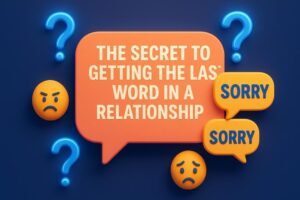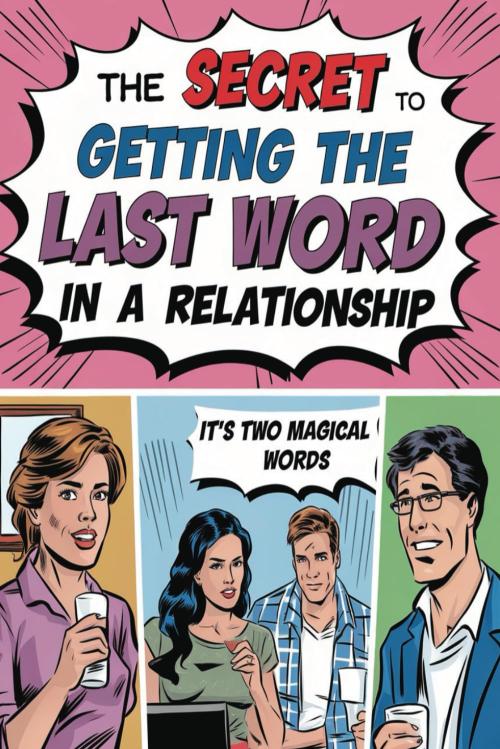Introduction: The Power of the Last Word

In any relationship—romantic, platonic, or professional—there’s a moment when a conversation tilts toward a showdown. Words fly. Tempers flare. Silence follows. And someone always wants the “last word.”
But here’s the twist: The secret to getting the last word in a relationship has nothing to do with wit, sarcasm, or shouting louder. In fact, it’s not about “winning” at all. It’s about two magical words that shift the entire dynamic.
What are they? Let’s find out.
The Myth of Winning the Argument
Many people associate having the last word with control. It’s often seen as the final stamp of authority or validation. But let’s compare two very different endings to the same argument.
📊 Comparison Table: Two Endings to the Same Conflict
| Scenario | Outcome A: “Winning” the Argument | Outcome B: Saying the Two Magical Words |
|---|---|---|
| Final words spoken | “That’s your problem, not mine!” | “I’m sorry.” or “Thank you.” |
| Emotional aftermath | Bitterness, emotional shutdown | Calm, emotional connection |
| Conflict resolution | Delayed or unresolved | Immediate de-escalation |
| Long-term impact | Resentment builds | Trust and safety are reinforced |
| Who really “wins”? | No one | The relationship |
In the first version, there’s power, maybe even some satisfaction—but it’s short-lived. In the second, there’s humility. Vulnerability. But there’s also resolution, healing, and deeper intimacy.
The Secret Revealed: The Two Magical Words
So, what are the two magical words?
“I’m sorry.”
or sometimes,
“Thank you.”
These may sound simple—even cliché—but their power is profound.
Why “I’m Sorry” Works
According to the Gottman Institute, one of the world’s leading research bodies on relationships, a key predictor of long-term success is a couple’s ability to repair conflict through small emotional bids, including sincere apologies.
Saying “I’m sorry” signals:
-
Accountability (without needing to be wrong about everything)
-
A willingness to reconnect emotionally
-
That ego is taking a back seat to empathy
Psychologist Harriet Lerner, in her book “Why Won’t You Apologize?”, argues that a genuine apology is one of the most powerful tools for emotional repair. But it has to come from an honest place—not as a tactic or bribe.
When “Thank You” Is the Last Word
Not every argument needs an apology. Sometimes, the tension arises from miscommunication, unmet expectations, or emotional misalignment.
That’s where “Thank you” can be powerful:
-
“Thank you for being honest with me.”
-
“Thank you for telling me how you feel.”
-
“Thank you for being patient while I figured it out.”
It’s gratitude in place of defense. Appreciation instead of accusation.
In conflict, appreciation is disarming. It throws off the expectation of retaliation. It says: I value you more than I value this disagreement.
Real-Life Examples: The Words in Action
💬 Hypothetical #1: “I’m Sorry”
Situation: A couple argues about forgotten plans.
Typical Ending: “You never listen!” → “Neither do you!”
Magical Ending: “I’m sorry I forgot our plans. You matter to me.”
Suddenly, the argument becomes less about forgetfulness and more about reestablishing importance.
💬 Hypothetical #2: “Thank You”
Situation: One partner opens up about feeling emotionally neglected.
Typical Ending: “I’m doing my best. Why isn’t that enough?”
Magical Ending: “Thank you for trusting me enough to share that.”
Instead of defensiveness, there’s validation. The tone shifts, and the walls come down.
How to Use These Words Authentically
✅ 1. Check Your Tone
Words matter—but tone does more. “I’m sorry” muttered sarcastically can escalate conflict. “Thank you” delivered with eye-rolling will never heal a wound. Use a soft, even tone and open body language.
✅ 2. Mean It
Authenticity is the secret ingredient. A fake apology can make things worse. If you’re not ready to say it sincerely, take a pause. Reflect. Return when you are.
✅ 3. Be Specific
Instead of “I’m sorry you feel that way” (which is passive-aggressive), try “I’m sorry I interrupted you earlier. It wasn’t respectful.”
Instead of a vague “Thanks,” try “Thank you for hanging in with me while I processed that.”
✅ 4. Use Timing Wisely
It’s okay to take a few breaths before saying the words. Timing them just right can give both sides a moment to step back and reset emotionally.
📉 Comparison Table: Winning vs. Resolving
| Aspect | Winning the Argument | Resolving the Argument |
|---|---|---|
| Focus | Proving your point | Understanding the other’s point |
| Goal | Dominance | Connection |
| Emotional residue | Bitterness, regret | Relief, closeness |
| Long-term result | More distance | Greater intimacy |
🖼️ [Suggested Infographic: “The Emotional Temperature Scale During Conflict”—showing how words like “sorry” and “thank you” lower emotional intensity.]
Why This Works (Backed by Research)
Studies in emotional intelligence and conflict resolution consistently show that apology and appreciation reduce cortisol levels (the stress hormone) and activate areas of the brain linked to empathy and bonding.
According to the Harvard Business Review, emotionally intelligent communicators who lead with empathy experience stronger relationships, better collaboration, and longer-lasting trust.
Even in non-romantic settings (friendships, workplace tension, parent-child conflicts), those two words—when used wisely—can defuse the storm and build bridges.
When It’s Hard to Say the Words…
Sometimes ego, pride, or hurt feelings make it hard to say “I’m sorry” or “Thank you.”
Here’s what to do when that happens:
-
Start with silence. Breathe. Don’t react.
-
Acknowledge your inner resistance. Ask yourself: is being “right” worth the cost?
-
Use a substitute. Even saying, “I need a moment to think about what you said” opens the door to future connection.
You don’t have to say the magic words immediately… but don’t let them die unspoken either.
Conclusion: The Last Word That Actually Matters
The secret to getting the last word in a relationship isn’t about clever comebacks or emotional mic drops. It’s about repairing the moment with two words that hold emotional intelligence, maturity, and connection:
“I’m sorry.”
or
“Thank you.”
These aren’t signs of weakness—they’re the strongest tools we have for building trust and resilience. The last word that wins is the one that heals.
Your Turn: What’s Your Go-To “Last Word”?
Have you ever diffused a fight with one phrase? Or wished you had said something different?
💬 Share your story in the comments below.
📩 Want more relationship insights and emotional intelligence tools? Subscribe to our newsletter.
🎯 Try a 7-day “Two Word Challenge”: Use either “I’m sorry” or “Thank you” every day and watch your relationships shift.
🎁 Want the ultimate last word in a relationship?
Then give them this:
📕 The Secret to Getting the Last Word in a Relationship: Hint: It’s Two Magical Words — a hilarious prank gift disguised as a serious relationship guide… until they open it and realize it’s totally blank! 😆
🧠 Perfect for:
-
Couples with a sense of humor
-
White elephant gifts or gag presents
-
Anyone who thinks they always win the argument
👉 Click here to get the laugh on Amazon!
Because sometimes, the funniest advice… is no advice at all. 😂


